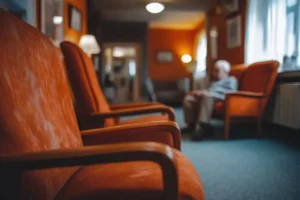07/25/2024
Types of Abuse in Nursing Homes
As our elderly population swells, an increasing number entrust the care of their loved ones to nursing homes. While many facilities uphold exceptional standards, a troubling few fail to address even the most basic resident needs and rights – paving the way for insidious neglect and abuse to take root.
In this eye-opening look, we’ll examine four types of abuse in nursing facilities and the glaring red flags that could signal your family member is suffering at the hands of inattentive or malicious caregivers: dehydration, bedsores, deficient hygiene, and unexplained injuries.
Dehydration: A Hidden Danger
One of the most frequently encountered warning signs of neglect in nursing homes is dehydration – a preventable yet potentially life-threatening condition.
With age comes a diminished thirst sensation and reduced kidney function, leaving seniors uniquely vulnerable to fluid imbalances. Left unchecked, dehydration can rapidly spiral into renal failure, chronic disorientation, and even seizures.
Be vigilant for these telltale symptoms:
- Dry Mouth and Cracked Lips – Often the first indicators of insufficient hydration are accompanied by a parched throat.
- Dark, Concentrated Urine – Dehydrated individuals produce scanter, more amber-colored urine as their bodies conserve precious fluids.
- Dizziness and Lightheadedness – Plummeting blood pressure from dehydration can trigger bouts of vertigo and faintness.
- Acute Confusion – Elders who fail to drink enough fluids may exhibit worrying cognitive lapses and disorientation.
If you suspect your loved one is suffering from dehydration, take immediate action. Contact the nursing home staff immediately to ensure your relative is getting sufficient fluids.
The Scourge of Bedsores
Bedsores, also known as pressure ulcers, represent a significant and preventable hazard plaguing countless nursing home residents. These painful skin lesions emerge when immobile patients endure prolonged pressure on the same areas of skin, gradually forming sores.
From mild irritations to deep, life-threatening wounds, advanced bedsores can unleash rampant infections and unimaginable suffering.
Be on high alert for these warning signs:
- Localized Redness – Ruddy, discolored spots frequently herald nascent bedsores. Even gentle contact may elicit wincing.
- Expressed Discomfort – In later stages, bedsores become exquisitely tender sources of agony and distress.
- Blistering or Open Wounds – Severe, untreated bedsores can rupture into oozing open wounds or fluid-filled blisters.
- Foul Odors – If bedsores become critically infected, they may emit pungent, foul odors as bacteria proliferate.
Should you discover bedsores manifesting on your loved one, it is imperative you elevate the issue to nursing home administrators immediately.
Insist they provide prompt treatment, pain management, and a comprehensive plan to prevent any reoccurrence through proper skin care, turning schedules, and adequate nutrition. If neglectful practices appear to be the root cause, do not hesitate to seek legal recourse.
Degradation of Basic Hygiene Rights
Nursing home residents retain the fundamental human right to live in clean, hygienic conditions and maintain their personal dignity through proper grooming.
Any flagrant violation creating unsanitary living quarters or deprivation of basic hygiene services could accelerate health crises and represent a severe dereliction of care standards.
Be alert to these potential red flags:
- Unclean, Cluttered Living Quarters – Nursing home common areas and personal rooms should always remain tidy and sanitized.
- Soiled, Unchanged Clothing – Residents unable to change themselves must have caregivers regularly provide fresh, clean garments.
- Malodorous, Unchanged Bedding – Bedding must be routinely swapped to prevent the buildup of bacteria, bodily fluids, and offensive smells.
- Poor Personal Hygiene – Nursing staff has a duty to ensure residents receive regular bathing, oral care, and grooming to maintain cleanliness.
If you notice these concerning issues, bring it to the attention of the facility supervisor immediately. Express your concern that these issues could lead to health problems. Request a clear plan for improvement and a timeline for implementation.
If the situation doesn’t improve quickly, consider involving a higher level of administration or contacting the local ombudsman for long-term care facilities.
Unexplained Injuries: When Something Is Very Wrong
Among the most harrowing signs of nursing home abuse or neglect, unexplained injuries demand an urgent and forceful response to protect your vulnerable loved ones. While accidents and falls regrettably occur among the elderly, any suspicious bruising, fractures, cuts, burns, or wounds could act as a neglect indicator in elderly care.
Recognizing signs of mistreatment in nursing homes:
- Bruises in Clusters or On Bony Areas – Grouped contusions, particularly around wrists or ankles, could indicate improper restraint techniques or even physical abuse are the common abuses in long-term care.
- Broken or Fractured Bones – Unexplained fractures, especially in localized areas prone to grabbing, may signal very rough handling or excessive force.
- Lacerations and Puncture Wounds – Cuts, tears, or piercing injuries with no plausible accidental explanation could be evidence of identifying abuse types in care facilities or neglectful care.
- Severe, Inexplicable Burns – Serious burns demand scrutiny into whether scalding liquids, fires, or even smoking materials were involved due to inadequate supervision.
If you discover any such concerning injuries adorning your loved one without a reasonable justification from staff, it is absolutely imperative you pursue the truth through all available channels immediately.
Firmly request a full accounting from administrators, while also notifying proper authorities such as the North Carolina Adult Protective Services or law enforcement to trigger an impartial investigation. Should their findings point towards neglect or abusive conduct, you may be entitled to pursue civil penalties.
Taking Action: Advocating for Dignity and Justice
As your loved one’s most indispensable voice and ally, you wield immense power to intercede on their behalf and ensure they never suffer the injustices of nursing home neglect or abuse.
Simply recognizing the red flags is half the battle – the other crucial half is composing a strategic, multi-pronged response to swiftly remedy any improprieties while shielding them from future harm.
- Document any Evidence – If you capture written records, photographs, or videos substantiating neglect or abusive mistreatment, preserve and catalog these materials meticulously.
- Voice Concerns to Administration – Schedule an urgent audience with the facility’s top leadership, communicate your grievances thoroughly, and demand decisive corrective action. Follow proper escalation protocols.
- Report Violations to Authorities – Agencies like the long-term care ombudsman program and your local Adult Protective Services branch can investigate suspected violations, advocating on behalf of the wronged.
- Explore Legal Actions – If blatant negligence or intentional misconduct has breached regulations resulting in your loved one’s injury, legal experts like those at Deuterman Law Group can advise you on seeking compensatory damages and justice.
You possess the power to be your loved one’s hero, steadfast champion, and voice when they cannot speak up against mistreatment. By heeding the Red Flags of nursing home neglect and responding proactively with decisive, multi-layered action, you can extract them from harm’s path and reinforce standards that prioritize their dignity.
Deuterman Law Group: Fierce Advocacy for Victims
If you feel that your loved one has been the victim of abuse or neglect in a North Carolina nursing home, please contact the Deuterman Law Group immediately.
Our nursing home neglect attorneys will help report the issue to the proper authorities, such as the county Adult Protective Services office. And we’ll gather information to assist in the investigation and prepare a claim against the owners and operators of the nursing home.
DISCLAIMER: The content on this blog is intended for general informational and educational purposes only. It is not legal advice and shouldn’t be treated as such. Laws can change, and the outcome of a legal matter often depends on the specific facts involved. What you read here may not apply to your unique situation.
If you have questions or need guidance on a personal injury matter, we invite you to contact us. Our team is here to listen, provide clarity, and help you understand your legal options.




